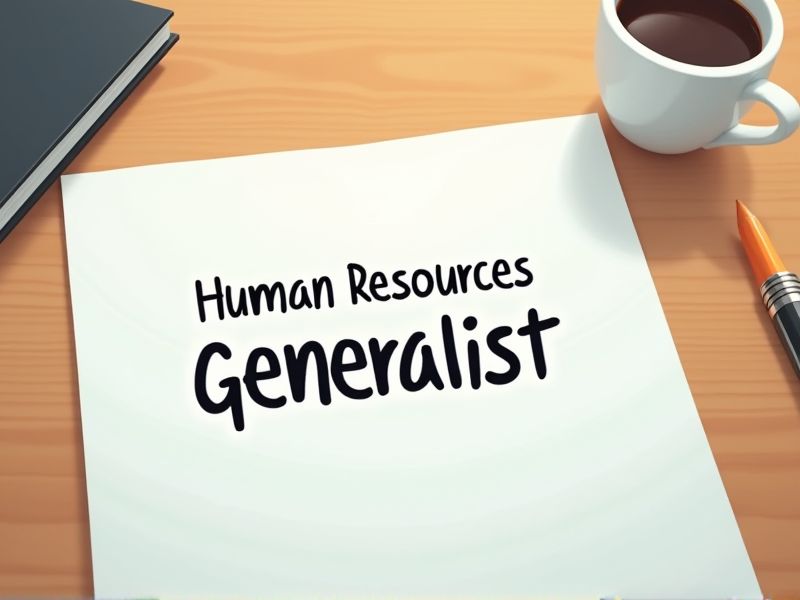
Human Resources Generalists play a pivotal role in managing employee relations, benefits, and compliance, requiring a thorough understanding of HR fundamentals. Certifications equip them with specialized knowledge and up-to-date practices crucial for navigating complex HR landscapes. They also provide credibility and demonstrate a commitment to professional development, enhancing career opportunities. Here are some certifications valuable for advancing in the role of a Human Resources Generalist.
Professional in Human Resources (PHR)
A Professional in Human Resources (PHR) certification ensures that a Human Resources Generalist possesses advanced knowledge of HR practices and principles, facilitating streamlined organizational processes. This certification elevates the HR Generalist's ability to handle complex employee relations scenarios effectively, promoting a harmonious workplace. With PHR certification, the HR professional can efficiently navigate legal and regulatory compliance, reducing the risk of costly violations for the organization. This credential also enhances strategic workforce planning, improving overall employee satisfaction and retention rates.
Senior Professional in Human Resources (SPHR)
The SPHR certification provides HR Generalists with advanced strategic thinking capabilities, which enhances their ability to align HR objectives with organizational goals. Possessing an SPHR often results in gaining credibility, allowing HR Generalists to influence executive decision-making effectively. Enhanced knowledge from SPHR training enables better management of complex HR functions, including compliance, benefits, and talent management. Holding this certification is linked with higher salary potentials, thereby attracting highly skilled professionals to HR roles.
SHRM Certified Professional (SHRM-CP)
SHRM certification aligns HR professionals with recognized industry standards, enhancing credibility and marketability. Earning the SHRM-CP equips a Human Resources Generalist with essential knowledge and skills required to effectively manage complex workplace situations. With evolving labor laws and regulations, SHRM-CP certification ensures that HR Generalists remain compliant and minimize organizational risks. SHRM-CP certification fosters professional development, increasing an HR Generalist's capability to implement strategic HR initiatives.
SHRM Senior Certified Professional (SHRM-SCP)
The SHRM Senior Certified Professional (SHRM-SCP) credential equips a Human Resources Generalist with advanced HR knowledge and strategic decision-making skills, enhancing their effectiveness. HR departments often experience complex challenges that require nuanced understanding of varying regulations and employee dynamics, which this certification addresses. Employers increasingly recognize the SHRM-SCP as a benchmark for expertise and leadership potential within HR roles. Certification increases professional credibility, fostering trust and communication with both employees and executives.
Global Professional in Human Resources (GPHR)
The Global Professional in Human Resources (GPHR) certification provides HR Generalists with expertise in international HR policies, enhancing their ability to manage diverse global workforces. This credential ensures they understand cross-border employment laws and cultural sensitivities, reducing legal risks for multinational companies. Possessing a GPHR demonstrates a commitment to global HR standards, increasing trust and credibility among global partners and stakeholders. With this certification, HR Generalists are better equipped to develop strategies that align with global business objectives, strengthening organizational effectiveness across different regions.
Certified Employee Benefit Specialist (CEBS)
A Certified Employee Benefit Specialist (CEBS) credential equips a Human Resources Generalist with specialized knowledge to design and manage competitive benefits packages, enhancing employee satisfaction and retention. This certification provides a deep understanding of regulatory compliance and risk management associated with employee benefits, reducing potential liabilities for the company. Employers value the CEBS designation as it demonstrates expertise in complex aspects of benefits, which can improve negotiation capabilities with benefits providers. The CEBS certification helps a Human Resources Generalist stay updated with the latest trends in employee benefits, ensuring the company remains competitive in attracting top talent.
Certified Compensation Professional (CCP)
A Certified Compensation Professional (CCP) is essential for a Human Resources Generalist to effectively design and manage competitive compensation packages that attract and retain talent. Without the expertise provided by CCP certification, HR generalists might struggle to ensure equitable pay structures, potentially leading to employee dissatisfaction and high turnover rates. CCP training equips HR professionals with the skills to align compensation programs with organizational goals, enhancing overall productivity and employee engagement. In a market-driven economy, CCP knowledge enables HR generalists to benchmark salaries against industry standards, ensuring the organization remains competitive.
HR Analytics Certification
HR Analytics Certification equips a Human Resources Generalist with the skills to analyze workforce data effectively, resulting in more informed decision-making. This certification enhances their ability to identify trends and patterns that can improve recruitment, retention, and employee engagement strategies. It also strengthens their competency in measuring the impact of HR initiatives on organizational performance. As businesses increasingly rely on data-driven insights, possessing HR analytics expertise becomes essential for staying competitive in the HR field.
Certified Talent Acquisition Strategist (CTAS)
A Certified Talent Acquisition Strategist (CTAS) equips a Human Resources Generalist with specialized skills to effectively identify and attract top talent. This certification enhances their ability to develop data-driven recruitment strategies that align with organizational goals. It empowers HR Generalists to navigate complex hiring processes and optimize candidate experiences. By integrating CTAS knowledge, they can contribute more efficiently to the company's competitive advantage in recruitment.
Certified Diversity and Inclusion Professional (CDIP)
The presence of a Certified Diversity and Inclusion Professional (CDIP) within a Human Resources team enhances the ability to effectively implement inclusive hiring practices, increasing workplace diversity. This certification equips HR generalists with specialized knowledge, enabling them to address and mitigate unconscious biases in recruitment and employee development processes. Integrating CDIP expertise facilitates the creation of policies that promote an equitable work environment, improving employee satisfaction and retention. The role also supports the organization's compliance with legal standards related to diversity, reducing the risk of potential discrimination claims.
Summary
When you obtain certifications as a Human Resources Generalist, your expertise and credibility in the field increase significantly. These credentials often make you more attractive to potential employers and can lead to higher job prospects. Certified HR Generalists frequently experience career advancement opportunities, including promotions and salary increments. Certification equips you with updated skills and knowledge, improving your efficiency and effectiveness in handling HR responsibilities.
